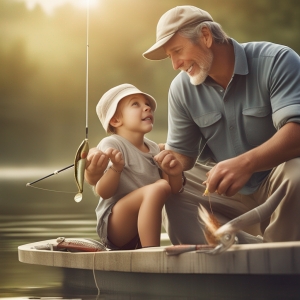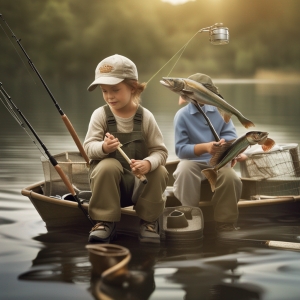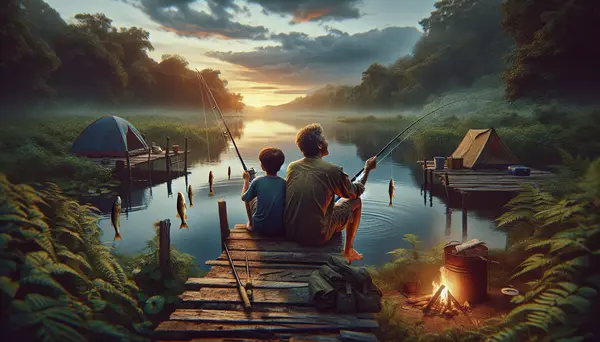Table of Contents:
Introduction: Discovering Fishing as a Fabulous Hobby for Parents and Child
If you're in search of a rewarding hobby that you can share with your child, look no further than fishing. Not only does this pursuit foster a love for nature and outdoor activity, but it also provides a platform to teach life skills, create unforgettable memories, and bond in a unique way with your child. This article will break down how fishing can be an enriching pastime for both children and adults alike, offering practical advice and key insights along the way.
Why Choose Fishing as a Family Hobby?
Fishing is not just your typical pastime, it's an adventure wrapped with teachable moments, patience, excitement and satisfaction. One might think it's a quiet activity, but that's where it offers the perfect blend of tranquility and thrill. Unlike most hobbies involving digital gadgets and screens, fishing encourages you to step outdoors, breathe in fresh air and look beyond the concrete jungle. It helps you and your child to reconnect with nature while igniting a spark of curiosity and reverence towards the marine world. Furthermore, fishing can be adapted to fit any preference, whether you prefer leisurely afternoons at a lake, thrilling deep-sea expeditions, or exploring quiet, hidden streams.
An Overview of Pros and Cons of Fishing as a Family Hobby
| Pros | Cons |
|---|---|
| Promotes Family Bonding | Requires Equipment Investment |
| Teaches Patience and Focus | Dependent on Weather Conditions |
| Introduction to Nature and Ecology | Potential Harm to Wildlife if not done properly |
| Can be Relaxing and Therapeutic | May be Boring for some children |
Bonding Time: Strengthen Parent-Child Relationship through Fishing

One of the most profound benefits of fishing as a shared hobby is the opportunity it presents to strengthen the bond between you and your child. In our busy modern lives, quality time often takes a backseat. But when you're fishing, things slow down and there's ample space for meaningful conversations, shared laughter, and the creation of lasting memories. The teamwork required in catching fish fosters mutual trust and understanding. This positive interaction helps build a strong and resilient parent-child relationship.
Fishing Skills: An Educational Adventure for Kids
Beyond the pure fun and bonding it offers, fishing is also an excellent educational tool for children. It teaches them the value of patience as they wait for a bite, and resilience when the fish don't cooperate. These are life skills that will serve them well beyond the riverbank.
Fishing also brings science to life. Children can learn about different kinds of fish, their habitats, and marine food chains. They may come to understand and respect nature and its preservation more from firsthand fishing experiences than from any textbook.
Moreover, fishing involves a certain level of physical activity too. From setting up the fishing rod to casting the line and reeling in a catch, kids can improve their motor skills and coordination in a fun, challenging way.
Getting Started with Fishing: A Basic Guide for Every Beginner

Starting with fishing as a hobby does not require a lot of equipment or expertise. The basic needs can be easily obtained and are not excessively expensive. Acquire a fishing rod suitable for beginners, some fishing line, a selection of hooks, and baits which can be anything from live worms to specific artificial lures.
Once you have your gear, teaching your child to cast is one of the first and most fun steps. Start with short distances and congratulate every progress. Remember, fishing is not just about the catch - it's about the shared experience, the lessons learned, and the journey as a whole.
To understand the regulations in your area regarding fishing licenses and allowed fishing locations, it's best to do a little research or speak with experienced anglers. Many communities have fishing clubs or organisations that offer guidance for beginners. Always ensure that you are fishing responsibly and adhering to local guidelines - this will also be an important lesson for your child to understand the importance of rules and respect for nature.
Finally, the crucial thing to keep in mind - always manage your and your child's expectations. Not every fishing trip will be successful in terms of catch, but the true value lies in spending quality time together, learning new skills, soaking up the beauty of nature, and sparking a lifelong love for fishing.
The Joys of Catching Your First Fish: A Milestone for Parents and Child
There really is nothing quite like the excitement that comes with catching your first fish. Your heart races as you feel the tug on the line and the wave of accomplishment washes over you when you reel it in. This exhilarating emotion is magnified when it's a shared experience between parent and child.
Witnessing your child's triumphant grin when they reel in their first catch, that too, is an unparalleled joy. It's an impromptu celebration marked by high fives, hearty laughter, and occasional jubilant tails. It's more than just a catch - it's a monumental milestone symbolizing patience, hard work, and perseverance.
These proud moments of accomplishments stay etched in your memories forever. They serve as reminders of shared joy and the precious bond that fishing can facilitate between you and your child. The first catch is rarely the biggest or the most exotic fish, but it's always the most memorable one, and, more often than not, it's the spark that ignites a lifelong passion for this tranquil, challenging, and rewarding hobby.
Fostering an Environment-conscious Mindset

Beyond the practical skills and personal values learned, fishing offers a unique platform to instill a keen appreciation for the environment in your child. Spending time near water bodies places them in direct interaction with various elements of nature. They're likely to observe the impact of wind on water surface, the migration of birds, the life beneath the water surface, and perhaps issues of pollution and littering in certain areas.
This exposure to the outdoors can start important conversations on environmental protection, ecology, and sustainability. Teach them about the importance of not disturbing the natural habitats and not leaving any litter around. They will also naturally learn about the effect of seasons on fish activity and movement, giving them real-life lessons about biology and climate.
By engaging in a hobby that requires them to function in harmony with the environment, children develop a heightened sense of responsibility towards preserving the natural world. They learn that sustaining their fishing hobby relies heavily on the health of the environment. This can translate into them becoming environment-friendly adults who actively contribute to preserving and reviving the planet.
Fishing as a Regular Family Activity: Health Benefits and Fun Outings
Incorporating fishing into your regular family activity roster brings a wholesome blend of fun and health benefits. Spending hours outdoors has been linked to improved mental health, reduced stress levels, and a boost in overall well-being. It allows both parents and children to unwind, step away from daily concerns and just bask in the serenity of mother nature.
Apart from mental health advantages, fishing also offers its share of physical fitness. The actions involved - casting the line, reeling a fish in, and even simple tasks like baiting the hook - these all engage various muscles and provide an enjoyable form of low-impact exercise. Plus, it's a fantastic way to get some much-needed fresh air and sunshine, a natural source of Vitamin D.
Fishing can also be the theme of fun family outings or vacations. Exploring different fishing spots, be it a quiet local lake or a bustling seaside, adds elements of adventure and discovery to the pastime. Family fishing tournaments can also provide a twist of friendly competition. Besides, there's the traditional joy of setting up a picnic by the waterside and enjoying a meal amidst nature.
Particularly for urban dwelling families, regular fishing trips can be refreshing escapes from city life, an opportunity to appreciate a slower pace and the soothing beauty of natural landscapes. Sounds like an ideal weekend plan, doesn't it?
Choosing the Right Fishing Gear for Your Family
When starting off, it's essential to select the right equipment that aligns with your family's fishing interests, locations, and of course, your budget. You don't need to splurge on the most expensive gear. Remember, fishing should be about the joy of the experience, not the cost of the equipment.
Your basic checklist should include a beginners' fishing rod and reel. For younger children, opt for a light and durable rod and a spincasting reel for easy manipulation. As they grow and gain more skills, you can gradually upgrade to spinning or baitcasting gear which provides more functionality.
Also crucial in your fishing gear is a variety of hooks, fishing lines, and baits. Keep a range of hook sizes to adapt to different species of fish. Consider buying a selection of live and artificial baits for various fishing situations. Always remember to use the type of bait and hook that won't harm the local fish population.
Lastly, don't forget your safety and comfort gear. Fishing may require standing or sitting for long periods, so items like comfortable chairs, proper attire, hats and sunscreen are essential. Also, keep in mind to have a first-aid kit handy for any minor injuries that might occur.
Choosing the right fishing gear fosters a pleasant fishing experience for both parents and child. However, know that your gear might take a hit or two during your early fishing ventures, so don't fret about mishaps and focus more on the enjoyment of the activity.
Making Fishing A Hobby: Encouraging Efforts and Perseverance
The road to making fishing a regular pastime involves both effort and perseverance, values that you and your child can cultivate together. Learning about the types of fish or the best baits to use requires patience and a willing attitude towards continuous learning. As you embark on this journey, you're navigating new experiences, which can be thrilling, confusing, and sometimes a bit overwhelming.
One thing to remember is that fishing is as much about the process as it is about throwing out a line and landing a big catch. There will be days when nothing you seem to do works. Fish can be elusive, and the bites may be few and far between. When this happens, emphasize the need for patience and persistence. Use these moments as a chance to teach your child that not every effort yields immediate rewards, and the key to long-term success often lies in the continued pursuit of our goals.
Over time, your shared experiences in fishing will build up a reservoir of shared stories, challenges, defeats, and victories. It's these shared experiences that foster deep relationships and create lasting memories. And as you and your child grow in your fishing skills, the sense of shared accomplishment will be a strong binding factor in your parent-child relationship.
So take up that rod, cast your lines, patiently wait, reel in, learn, laugh, and create unforgettable family memories right by the tranquil water bodies. Remember, every time you go fishing, you're not just casting a line, you're fostering a hobby filled with life lessons, friendship, and mutual respect for nature.
Conclusion: Building Lifelong Memories Via Fishing
In closing, it's important to highlight that fishing as a hobby does more than just fill leisure time. It's an avenue for personal growth, an enriching educational experience, and a means of establishing a deeper connection with nature. Above all, it presents a priceless opportunity to weave a tapestry of shared experiences and cherished memories with your child. Remember, it's not the number of fish you catch, but the moments you reel in together that count the most.
Here's to happy fishing and creating a legacy of love, learning, and laughter with your child! Tight lines and good times await you both.
Frequently Asked Questions on Parent-Child Fishing Activities
What are the benefits of fishing as a hobby for parents and children?
Fishing encourages bonding time, teaches patience, increases motor planning skills, improves concentration and appreciation of nature.
At what age is it suitable to introduce children to fishing?
Although it varies, it's typically appropriate to introduce children to fishing around the age of 4 to 6 years.
What type of fishing is best to start with for children?
Starting with basic freshwater fishing can be a good place to start because equipment is minimal and you can fish from land.
What should I bring for a fishing trip with a child?
Essential items are fishing rods, baits, sunscreen, first aid kit, snacks, water, and patience.
Are there any safety measures I should take while fishing with a child?
Yes, ensure the child is always supervised, wearing a life jacket near water, using safe and age-appropriate fishing gear.







